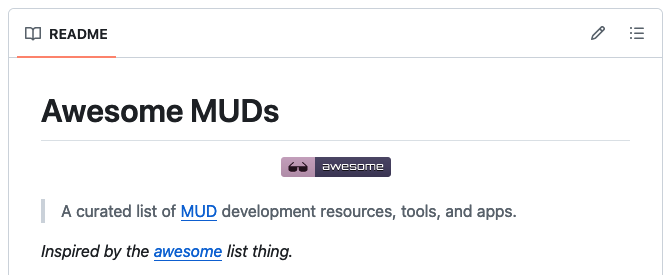We now have a comment system in the blog, using giscus. Take a look in any blog post view, like this one, and there it will be.
The comments are stored as Discussions in the Github repository for this web.
We now have a comment system in the blog, using giscus. Take a look in any blog post view, like this one, and there it will be.
The comments are stored as Discussions in the Github repository for this web.
The academic paper “Hearts, Clubs, Diamonds, Spades: Players Who Suit MUDs” was written by Richard Bartle. Published in 1996, it is a seminal work in the field of game studies and player psychology. In this paper, Bartle categorizes players of Multi-User Dungeons (MUDs), into four distinct types based on their preferred activities and motivations within the game. These types are:
Bartle’s taxonomy has been influential in the design of multiplayer games and understanding player behavior. It has also been adapted and expanded upon in various studies and applications in game development, marketing, and user experience design. We will be visiting those kind of studies in future entries of this new section called “Paper of the Week”.
Read it online, it’s really worth it.
For some time now, we have been maintaining the GitHub repository awesome-muds, which contains a large list of resources, articles, technologies, etc., related to the world of MUDs. It includes some history, links to available clients for different operating systems… a little bit of everything.
Take a look, and if you think there is something that could or should be changed, improved, or added, feel free to open an issue to discuss it.

The Hexagon mudlib/framework has been updated with new packages, which include the following:
crypt: code and command to encrypt and decrypt files, based on Dave Ljung’s (Jubal) code, ported to be used with DGD and Hexagon.json: code to encode and decode LPC values as json strings. Modified from an LPC snippet created for MudOS, changed to be executed with DGD.uuid: easy way to create uuid strings (RFC4122), also addapted from an LPC snippet.Take a look inside the /mudlib/packages directory in the repository to see the code, documentation and license for each package.
The Hexagon mudlib has reached at last its version 2.0, codenamed Castle Black. It’s a major release that includes a lot of changes and improvements, and it’s the first one that we can say is a beta version, after a lot of years in alpha. It’s a renaming of the v1.24.04 version. The next planned version will be v2.1 Daggerfall.
For developers: The Docker container images we are using for the MUDs we host are not anymore in Docker Hub, now they are in the Github Container Registry, just in case anybody want to tests things in their own computers.
DGD image, MudOS Images. You can always find them in their respective repositories, in the right column, under the packages section.
Valve’s “Secret Weapon”, by Game Maker’s Toolkit.
A video about the importance of Playtesting, centered in the experiences of Valve while developing Portal.
At last, the demo-fantasy game included with the Hexagon mudlib is fully functional. You can start the mudlib, choose a game, create a character, and test it. It has a full map with three towns, each of them with pub and shop, multiple npcs, several items, etc.
An : Naduk |
It is based in a very old newbie area made for the Reinos de Leyenda mud, circa maybe 1997. The code is new (as we use a different driver, from MudOS to DGD, and a new mudlib, from frmudlib to hexagon, and now it’s multilanguage, both in english and spanish), but the map and the names have been kept, as an homage.
You can take a look to the game, it is included with the mudlib as an example of how to create your own game. Take a look at it in /mudlib/games/demo-fantasy in the Hexagon repository.
Using the new packages functionality, I’ve added a new package to the Hexagon mudlib: the issue tracker.
![]()
The package adds its own command issues, where you can list, close, remove or open issues.
We can create new issues automatically, i.e. when a shop cannot load an item:
// create new issue, same message as npcs equipment |

We’ve reached the 1000 commits mark in the Hexagon mudlib project, since the first commit in 26 Aug 2014, when we started porting the ccmudlib project to DGD.